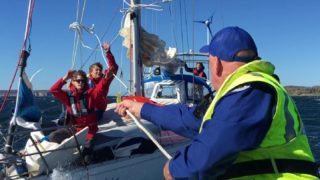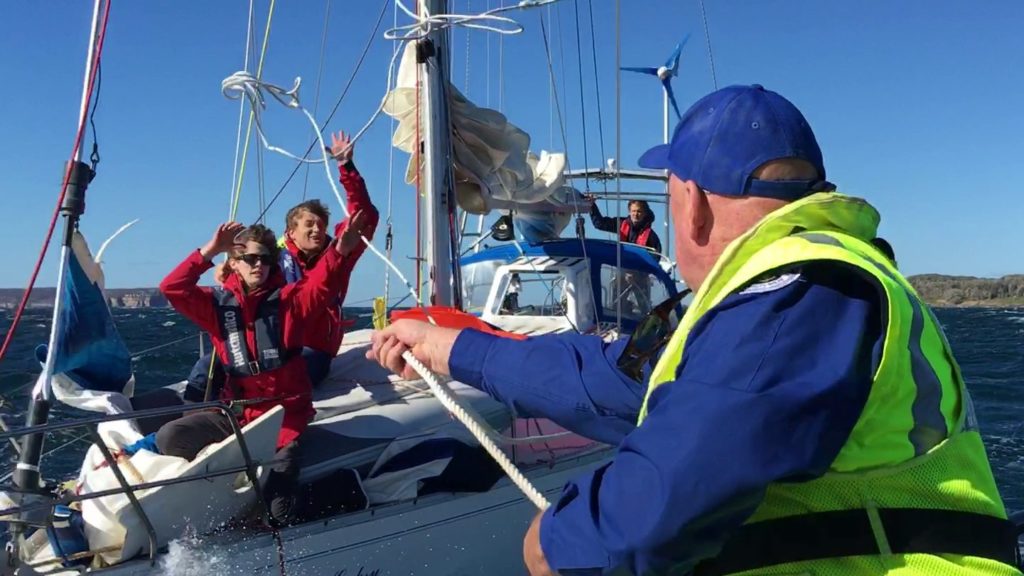Log On and Log Off with us.
When you Log On, info about your trip - such as when you're due back - helps us find you if something doesn't go according to plan.


It only takes a moment to protect your life. Log On with your local Marine Rescue unit using your boat’s radio or our app.
When you Log On, info about your trip - such as when you're due back - helps us find you if something doesn't go according to plan.
Our professional volunteers know the local waters. Ask them about weather, conditions and advice for your journey.
Make sure everyone on board is wearing the right safety equipment.
The majority of distress calls Marine Rescue NSW receives each year are from boaters stranded by engine breakdowns, battery failures and fuel problems. Often the result of inadequate maintenance and preparation, overdue servicing or other easily prevented issues, these minor problems can easily turn into major emergencies at sea.
Many of the most common problems emerge at the start of the boating season after a vessel has been sitting idle throughout the winter. After time off the water, your boat might start as expected when you next launch it but your motor could be at risk of cutting out some time after you’ve headed out.
A pre-season check-up can help prevent many problems and ensure you have an enjoyable day that doesn’t finish at the end of a tow rope. If you’re not confident that you can depend on every item to do its job, repair or replace it. Don’t risk it: fix it. You can do the required safety checks and basic maintenance yourself but otherwise, ensure you use a qualified member of the Marine Industry Mechanical Repairers Association.
If you’re heading two nautical miles offshore, you are required to have an EPIRB and marine radio.
The safety equipment that needs to be carried on board varies depending upon whether you’re on open or enclosed waters but it includes appropriate lifejackets for each person; anchor and chain/line; bailer/bucket/fire bucket with lanyard; bilge pump; compass; distress flares; fire extinguisher; paper or electronic map/chart for the area you’re heading; paddles or oars and rowlocks; safety label; sound signal – air horn/whistle/bell; V sheet – 1.8m x 1.2m minimum; 2 litres of water per person; and a waterproof torch.
Different requirements apply for craft such as canoes, kayaks, dinghies, sailing vessels, dragon boats and Personal Water Craft (jet skis).
All safety equipment carried on board must be: • In good condition and meet appropriate standards or specifications • Maintained or serviced according to manufacturer’s specifications • Replaced before the expiry date listed by manufacturer (if applicable) • Stored in an easily accessible location.
An Emergency Position Indicating Radio Beacon (EPIRB) suitable for marine use must transmit on 406 MHz and conform with all relevant standards. A 406 MHz EPIRB only complies if it conforms with Standard AS/NZS 4280.1 (It is the ‘1’ which indicates compliance). Any 406 MHz EPIRB must be properly registered with the Australian Maritime Safety Authority (AMSA). For information about registration, visit beacons.amsa.gov.au/registration.
A 406 MHz EPIRB is a simple and effective alerting and locating device that is compulsory for all vessels operating more than two nautical miles from the shore. It is also recommended for all vessels operating in remote locations or areas of high risk. The EPIRB should be accessible but stowed to avoid inadvertent activation. Do not stow the EPIRB in the bottom of a locker.
See the Boating Handbook for more.
The Bureau of Meteorology provides a24/7 forecast and wind warning service for all Australian coastal waters.
Always check the weather forecast at bom.gov.au/marine/ before you head out. For graphical forecasts go to bom.gov.au/australia/meteye/ and zoom into your location.
Check if there are warnings current for your area and whether conditions will affect safe navigation. What are the wave conditions and wind trends? When is the next low and high tide?
If you are in doubt about your or your boat’s ability to handle the conditions, don’t go out.
Listen to your marine radio for weather updates and warnings broadcast by Marine Rescue NSW radio bases.
Warnings are available by phoning 1300 659 218 or checking the BOM website for information. The weather for your local area also is available on the MarineRescue app
Coastal bar crossings can be hazardous, particularly for small, unstable vessels or boaters who are inexperienced or unfamiliar with local conditions.
NSW Maritime has free web-cam vision of 22 coastal bars and other important locations to help boaters and skippers prepare for a safe and responsible voyage.
Live web cameras are just one part of a suite of measures to help boaters decide whether they can navigate bar crossings safely.
Cameras are installed on bars on the North Coast, Hunter Valley, the South Coast and Lake Eucumbene.
The members of your local Marine Rescue NSW unit are the experts on their local waterways. Many of our volunteers have been navigating those waters for years, if not decades.
They are willing to share their knowledge to help keep boaters safer.
If you are uncertain of the conditions or unfamiliar with the area’s waterways, you can seek advice and information at any time from our experienced, trained crew members. Drop by your local unit’s base or call on your marine radio as you’re heading out.
Every week Marine Rescue NSW crews rescue boaters who have simply run out of fuel, often some distance offshore. Before heading out, make sure you have enough fuel to get to your planned destination – and home again.
If your boat has been off the water for some time, the fuel is likely to be stale and should be replaced.
A day out on the boat, exposed to the elements, can be hot and it is easy to become dehydrated.
Two litres of fresh drinking water per person must be carried on all vessels operating on any open (ocean) waters. It is sensible to ensure that you have sufficient water on board no matter where you are heading.
Marine radios are compulsory for all vessels operating more than two nautical miles out to sea, and are recommended for anyone boating on open (ocean) waters. A radio provides you with a means of advising Marine Rescue NSW of your whereabouts, checking boating weather and navigational warnings and making distress calls which can be picked up by our radio bases and other nearby boaters.
A mobile phone does not replace the requirement to carry a marine radio but is an extra means of communication. Call Triple Zero (000) in any life threatening situation and ask for Police.
Your radio is one of the most important pieces of safety equipment on board – but only if you know how to use it. If you’re keen to brush up on your skills, a number of Marine Rescue NSW units offer radio licence courses for members of the boating community.
Make sure everyone on board is wearing an appropriate lifejacket whenever you’re heading out. It’s the simplest precaution you can take to protect yourself, your family and friends.
If you are not wearing your lifejacket, it cannot save your life. An emergency can happen in the blink of an eye on the water. You could easily be incapacitated by a medical crisis or unable to reach your lifejacket if the boat is sinking. Don’t risk it – wear it.
An approved lifejacket must be carried for each person on board most vessels. It must be the correct size for the wearer, in good condition and, if an inflatable lifejacket, properly serviced. Penalties may apply to the owners and masters of vessels found not carrying lifejackets, or if there are not enough lifejackets for everyone on board. Penalties may also apply if occupants are not wearing lifejackets when they are required to do so.
For more information about lifejackets visit rms.nsw.gov.au/lifejackets.
Lindsay McGown and Daren Bayldon were returning from a fishing trip when their boat sank off Beares Beach, south of Bermagui, in November 2019. The vessel’s EPIRB was under a shelf and under water within an instant, prompting the boaters to encourage others to keep their EPIRB close at hand in case of an emergency.
If things don’t go according to plan on the water, you don’t want to be scrabbling to reach your lifejackets, EPIRB and flares, radio or other safety equipment.
Ensure your life-saving gear is within arm’s reach. Make sure you can reach your EPIRB but it is not stored somewhere that it can be easily activated, triggering a full-scale search and rescue operation for a false alarm.
Make sure everyone on board is familiar with the location and use of the boat’s safety gear in case the skipper is incapacitated in an emergency or medical crisis.
In particular, they should know how to reach and use the marine radio, EPIRB and other means for signalling that they need help.
It’s quick, simple and free. Tell us where you’re heading, how many people are on board and when you’re planning to return. We’ll keep watch and if you’re not back as planned, we’ll swing into action to locate you.
Make every journey safer, Log On with Marine Rescue NSW on VHF Channel 16 or the free MarineRescue App.
Boating safety is a shared responsibility but remember, as the skipper, you’re responsible for the safety of your vessel and those on board.
Make sure you know the rules for operating safely on our waterways, whether you’re on a powered vessel or paddling on a canoe, kayak or other craft.
After you’ve completed your safety checklist, Logged On with Marine Rescue NSW and headed out on the water, keep your radio on VHF Channel 16 (or 27MHz Channel 88) and listen out for warning messages broadcast by Marine Rescue NSW or calls for help from boaters who might be nearby.
Always travel at a safe speed and keep a careful lookout. Make sure your safety gear is within arm’s reach and that everyone on board is wearing a lifejacket.
The essential rules of the water are spelt out in the NSW Government Boating Handbook.
This valuable guide covers topics including: